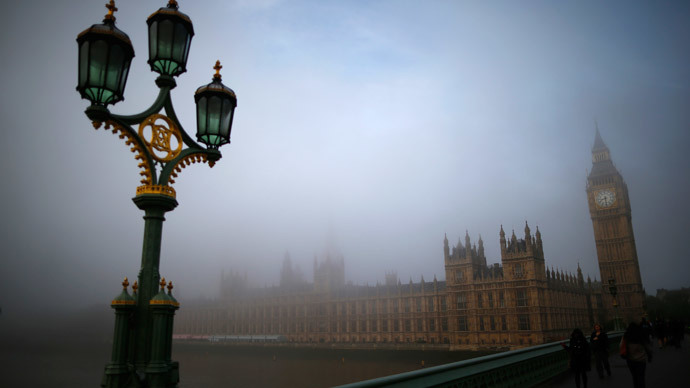UK journalists could be labeled 'terrorists' for attempting to uphold public interest

British journalists who publish politically motivated content could be labeled terrorists if UK authorities deem the material to be a threat to public safety, according to Britain’s counter-terrorism watchdog.
In his annual report published on July 22, the UK's Independent Reviewer of Terrorism Legislation David Anderson QC emphasized the UK’s anti-terror laws were simply too broad. His comprehensive review was presented to parliament by Britain’s Home Secretary on Tuesday morning.
Anderson references the case of David Miranda – the spouse of journalist Glenn Greenwald, who was first contacted by Edward Snowden regarding the NSA leaks – as an example of how British authorities’ scope to enforce anti-terrorism laws is problematic.
By validating state authorities’ treatment of Miranda, Britain’s legal system “highlighted the remarkable (and some would say alarming) breadth of the UK’s current definition of terrorism,” the watchdog stated.
While anti-terror legislation gives British authorities the leverage needed to tackle Al-Qaeda and far-right extremists, these powers should be used sparingly, retained only for their proper purpose, Anderson cautions.

The watchdog cited three concrete examples illustrating the obscurity of Britain’s overly broad anti-terror legislation in his report. These included conduct aimed at influencing government figures, hate crimes, and what Anderson terms the "penumbra of terrorism.”
With respect to his first concern, Anderson observed that Britain’s current legislation frames the politically motivated release of content considered to jeopardize life or the health and safety of UK citizens as terrorist activity – particularly if carried out to influence government officials.
The fact that media commentators with no intention of inciting widespread fear – many of whom believe they are acting for the greater good – can be accused of terrorism implies a need for stringent reform, Anderson warns.
Expressing grave concern about the scope of Britain's terrorism legislation, Anderson said: "It seems that the writing of a book, an article or a blog, may...amount to terrorism if publication is for the purpose of advancing a political, religious, racial or ideological cause, designed to influence the government and liable to endanger life, or create a serious risk to health or safety."
In other EU and Commonwealth states, the publication of such content would not qualify as terrorism unless a concrete “intention to coerce or intimidate” could be proven, he emphasizes. But under UK legislation, journalists and bloggers could be branded terrorists in instances where they lack any intention to intimidate or frighten citizens – as could their employers and advocates.
With respect to the watchdog's second concern of hate crimes, UK law defines a pupil who threatens to shoot their teacher on a fascist internet platform as a terrorist. The same can be said for a racist who hurls a pipe bomb at their neighbor’s property, Anderson observes.
While both acts are criminal, they are characterized by an intention to harm specific individuals. In this sense, framing such criminal conduct as terrorism serves absolutely no purpose whatsoever, according to the Independent Reviewer.
Regarding Anderson's final concern of the “penumbra of terrorism,” a scenario of guilt by benign association is apparent. The watchdog sharply criticizes the fact that family members who have no direct involvement in acts of terrorism can be branded terrorists simply by virtue of their association with and support of others who are implicated in such acts.
While tough counter-terrorism laws are essential in protecting and preserving Britain’s national security, the state’s current anti-terror legislative scope is excessive, according to Anderson's report.
The fact that British journalists and bloggers attempting to enliven public debate and preserve the public interest can currently be labeled terrorists implies a need for concrete legislative reform. Equally, framing criminal actions targeted at immediate victims - and the conduct of those who bear an obtuse association to such acts - as terrorism is utterly unnecessary, Anderson emphasizes.
“The public accepts special terrorism laws so long as they are used only when necessary. But they can currently be applied to journalists and bloggers, to criminals who have no concern other than their immediate victim, and to those who are connected with terrorism only at several removes,” he said on Tuesday.
Reflecting on the absurdity of Britain’s overly broad anti-terror legislation, the watchdog called for widespread reform, demanding Britain’s parliament review the legal definition of terrorism.
A failure to do so could facilitate the abuse of the state’s anti-terror laws, and risk jeopardizing the public’s support for “special powers that are unfortunately likely to be needed for the foreseeable future,” Anderson warns.














